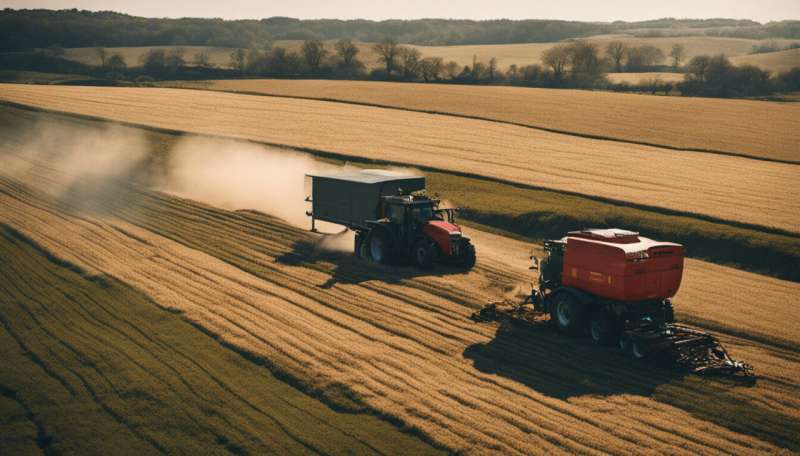This article has been reviewed according to Science X's editorial process and policies. Editors have highlighted the following attributes while ensuring the content's credibility:
fact-checked
trusted source
written by researcher(s)
proofread
Here's why farmers are bearing the brunt of big food companies' decarbonization efforts

More than a third of the global greenhouse gas emissions resulting from human activity can be attributed to the way we produce, process and package food. So it comes as no surprise that many large companies involved in food production and retailing are under pressure from investors, politicians and environmental groups to clean up their operations.
Having a carbon-neutral supply chain isn't just good for the environment, it's a smart business move too, especially at a time when the public is growing more concerned about the negative effects of climate change.
Several leading fast-food chains are starting to take note. McDonald's, for example, has announced plans to achieve net zero emissions from its entire business operation by 2040.
Yet the corporate rush to reduce the environmental footprint of their food supply chains poses several challenges for farmers. These supply chains—from providing ingredients, to processing and retailing—are mainly controlled by a handful of large companies. In the US, Walmart holds a quarter of the grocery market share, while Tesco commands 27% of the UK's food retail sector.
This level of concentration means that initiatives for decarbonizing the food supply system are spearheaded by large companies. This is a problem because the proposed measures are often impractical for smaller farms, expensive or lack buy-in from farmers.
Voluntary or compulsory?
Many large companies have sought to offset emissions that are hard to reduce by buying carbon credits. These are permits that allow the owner to emit a certain amount of carbon dioxide.
However, there is a growing issue with the credibility of carbon offset programs. So firms risk being accused of "greenwashing" or facing potential legal challenges for spurious carbon offsets. Many of these firms are now shifting their focus towards decarbonizing their own operations, by tackling emissions directly throughout their entire supply chain.
This shift directly affects farmers. For instance, a cattle farm in Brazil that supplies beef to a transnational retailer overseas would now be obliged to comply with emission-reduction measures imposed by that retailer.
These measures may include changes to grazing land or the installation of digesters (closed tanks where microorganisms break down organic material such as cow manure). But they can be very costly to implement for small farms and can expose them to the risk of exclusion from global markets.
Research by the British bank Barclays indicates that, in 2021, UK retailers cancelled contracts worth over £7 billion with suppliers as a result of failure to meet sustainability standards.
Constrained by the influence of these companies, farmers also lose their ability to use practices that result in substantial, although challenging to measure, reductions in emissions. One such practice involves the selective breeding of cattle for greater feed efficiency.
By doing so, farmers can raise cattle herds that consume less feed and produce fewer greenhouse gases, all while maintaining milk and meat production. According to a UK government report, this breeding strategy has the potential to reduce beef-related greenhouse gas emissions by 27% across the whole industry over a 20-year period.
Still, a modeling study my colleagues and I conducted in 2016, found that farmers are unlikely to adopt this practice if beef processors—primarily large companies downstream in the supply chain—do not pay for feed-efficient cows. Even though our results were published a few years ago, the situation remains largely unchanged.
Getting off the fence
Achieving a transition to net zero that is fair will require that farmers have a say over how to go about it. With an in-depth knowledge of their land, crops and animals, farmers can help to implement measures and set targets that are practical, effective and attainable.
There are encouraging signs that this is starting to happen in several countries. The UK's National Farmers Union, which represents over 55,000 farmers in England and Wales, has set an ambitious target of reaching net zero by 2040. Similarly, the Dairy Farmers of Canada plan to achieve net zero by 2050.
But these initiatives must extend beyond mere rhetoric and vague net zero targets, towards tangible actions. The capacity of farmers to measure, report and verify on-farm emissions must be improved through better training and innovation.
Currently, measuring a farm's carbon emissions is difficult. There are as many as 64 different carbon farm accounting tools in use, each differing in terms of their scope and data requirements. This lack of standardization can diminish the credibility of decarbonization schemes and potentially discourage farmers from participating.
Providing farmers with the right incentives is critical. The multinational dairy cooperative Arla Foods provides farmers with €0.03 per kg for engaging in sustainability activities, such as using renewable energy, and €0.01 per kg for submitting emissions data using the firm's carbon accounting tool. More initiatives like this are needed across the industry to gather emission data from farms and incentivize change.
Decarbonizing our food system hinges on major food companies, farmers, policymakers and environmental advocacy groups taking action together. This action must be practical and measurable and offer the right incentives, not only to companies, but also to farmers.
Provided by The Conversation
This article is republished from The Conversation under a Creative Commons license. Read the original article.![]()




















